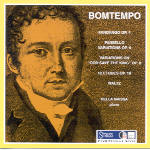Here’s a neat introduction to João Domingos Bomtempo’s inventive, bracingly idiomatic, and highly effective piano music. Five years younger than Beethoven, Bomtempo was Portugal’s most important composer in the Classical era. His sunny, extroverted Fandango and Paisiello Variations are smartly-put-together works that fuse Beethoven-like drama and Mozartean elegance with Bontempo’s own brand of subtle harmonic digressions. If Bomtempo could play the whirlwind scales, rotary passages, and two-handed double-note excursions that he wrote down on paper, then he must have been one heck of a pianist. To be sure, the “God Save the King” variations ramble on a bit, especially in the lengthy “where am I going” introduction that proceeds the theme’s first appearance. But the 12 Op. 19 Etudes are charming “songs without words” whose textures venture into new territories that later composers like Schumann would make famous: try the B-flat minor’s alternating melody/chord patterns, the volatile left-hand runs in the D major selection, or the burly perpetual-motion octaves in the G minor etude. By contrast, the inner-voice trills in the long A major etude evoke similar textures in Beethoven’s last three sonatas.
Nella Maissa serves up the Fandango and the two variation sets with tremendous style and crisp, colorful fingerwork. She brings the same authority to the etudes, but some of the more difficult passages aren’t as fluent and powerful as they might have been. Then again, the close, dry miking lacks body and amplitude, unwittingly (or maybe not) reducing Maissa’s tone down to fortepiano proportions. Still, you can’t deny a master pianist is at play. The rest of her Bomtempo cycle is worth checking out, as is her superb Hindemith Ludus Tonalis, all available from Strauss.
































